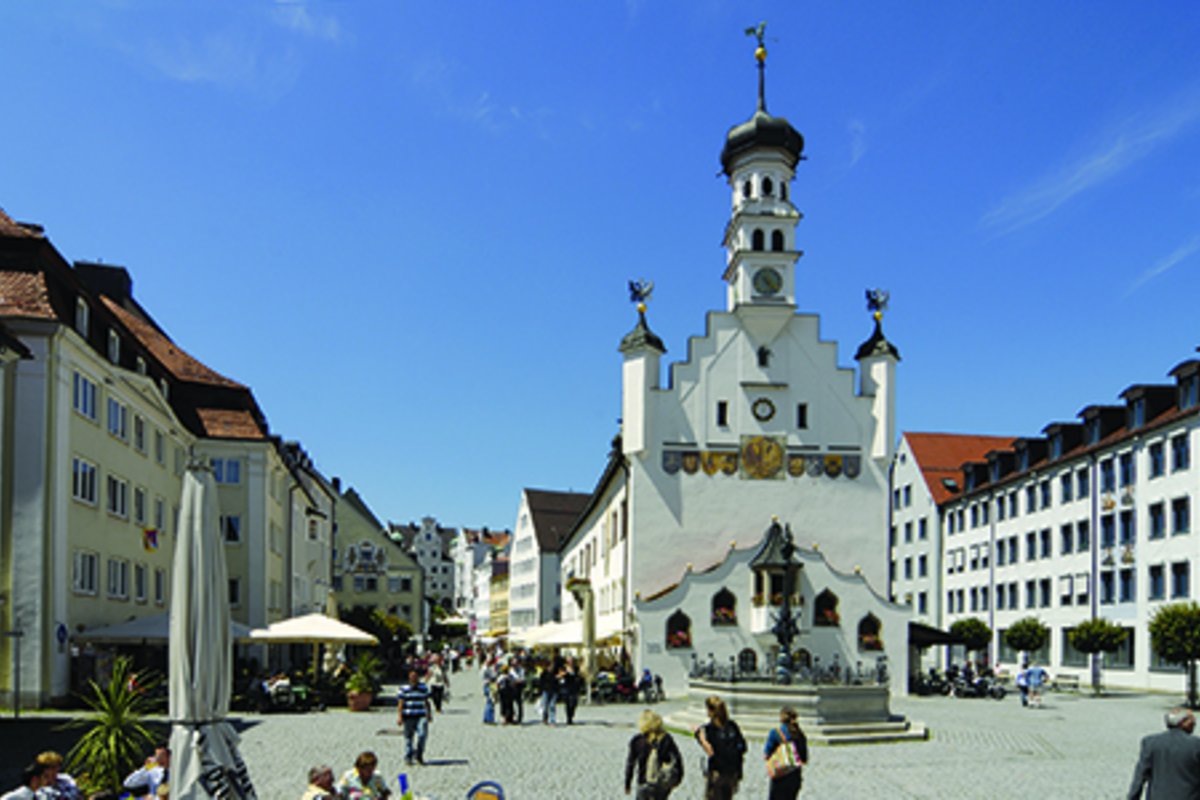Have you already honed a keen feeling for complex mechatronic systems during your bachelor’s degree? If so, you can channel your skills into developing future-focused technologies in this master’s degree programme in Automation and Robotics.
The programme teaches the cutting-edge, application-oriented specialist knowledge that will be in high demand in the industrial landscape of production powerhouse Germany.
You will gain a profound understanding of the interrelationship between mechatronic components in automation engineering. After gaining your master’s degree, you will able to select the appropriate sensor systems and integrate them into automated production environments, then evaluate the data harvested this way to optimise operations. You will learn how to adeptly control the essential simulation tools and create dynamic designs for multi-component systems.
Apply hereAt a glance
Award
Master of Engineering (M. Eng.)
Study mode
full-time, part-time
Standard duration
3
ECTS credits
90
Starts
winter semester
summer semesterRestricted admission
no
Taught in
German
Faculty
Electrical Engineering
Study abroad
optional
Accreditation
ASIIN
Details about this course
This programme is designed to be completed full-time for the duration of three semesters, but is can also be studied part-time spread over six semesters.
The six modules taught during the two lecture-based semesters cover the key elements of automation engineering and robotics. The project that students complete develops a deeper understanding of the challenges and processes that prevail in the field of automation. You choose three further advanced modules to reflect the subjects you wish to specialise in and further hone your professional profile.
A master’s thesis accompanied by a seminar series in the third semester rounds the programme off. Successfully completing this element demonstrates your ability to work scientifically and methodically on a defined task and then present and defend your conclusions.
Students can switch in either direction between full-time and part-time study. The same admission criteria apply to both options. For further information, please consult the Module Handbook. (PDF)
The university awards students who successfully complete the programme the academic title Master of Engineering (M.Eng.)
Complex automated plants are mechatronic systems for the efficient manufacture of high-quality products. Departments in the field of information processing are unleashing new possibilities for optimising plants and evaluating the information gathered in the process.
Besides that, new roles are emerging in robotics beyond production engineering, such as in service robotics, which call for graduates with higher qualifications. Innovative solutions are crucial to manufacturing today’s technically demanding products in the required quality at competitive prices in Germany and Europe.
Requirements
To enrol on the master’s degree programme in Automation and Robotics, you must have:
- Completed a bachelor’s degree or German “Diplom” in mechatronics, mechanical engineering, electrical engineering, packaging technology, industrial engineering for either mechanical engineering or electrotechnology, or an equivalent subject at a German or foreign university accruing at least 210 Credit Points (CP) according to the European Credit Transfer System (ECTS) (final grade at least 2.5 = “good”), or an equivalent formal qualification. The Examination Board is responsible for decisions on the equivalence of degrees and grades equating to “good”.
- Demonstrate suitability for this degree programme in an aptitude test.
If your degree certificate cannot be presented by the application deadline, then official evidence of your examination performance to date (transcript of records) totalling at least 180 CP must be submitted. Should 180 Credit Points not yet have been accumulated, then official evidence must be submitted – by 20 February for admission to the following winter semester (cut-off period) – of the applicant’s entire examination performance (apart from the bachelor’s thesis) required to complete the bachelor’s degree at the awarding university. Formal registration can only be completed upon submission of the degree certificate, by the end of the first semester, at the latest.
Graduates with a 6-semester bachelor’s degree (without a practical semester) will be required to submit evidence of a continuous period of no less than 20 weeks’ professional activity in a field related to a bachelor’s in mechatronics before the master’s thesis can be allocated. Graduates with a 6-semester bachelor’s degree (including a practical semester) will be required to acquire a further 30 ECTS points through study and examinations before the master’s thesis can be allocated. Decisions regarding the fulfilment of requirements, admissions and type and scope of subsequent studies and examinations are made by the Examinations Board in liaison with the degree programme coordinator.
Applications
Would you like to apply for a place on the master’s degree programme Automation Engineering and Robotics at Kempten University of Applied Sciences?
Please check the information about
- admission requirements and the applications process first.
- Applying to study for a master’s degree
Apply in three steps
- Online application: Submit an electronic “application for admission” to study on this degree programme. To do so, please enter all the required details into the online form, which is then transmitted via an encoded connection to Kempten University of Applied Sciences. During the online application process, you will be invited to download various documents, depending on the information you provide.
- Written application: To complete your application, print your “application for admission” and the forms provided by the university.
- Attach the following required documents:
- Curriculum vitae / ID photo (curriculum vitae form)
- Completed questionnaire on applying for the master’s degree programme in Automation Engineering und Robotics (questionnaire form)
- Colour copy of an official form of ID (doesn’t need to be certified)
- Certificate of eligibility for university (officially certified)
- Evidence of undergraduate degree in mechatronics, mechanical engineering, electrical engineering, packaging technology, industrial/mechanical engineering, industrial/electrical engineering or equivalent with at least 210 ECTS points (average final grade of at least 2.5 / “good”)
- External applicants: Please attach – if you don’t have your degree certificate – confirmation from your university of your average grade (based on at least 180 ECTS points). Should 180 Credit Points not yet have been accumulated, then formal evidence must be submitted – by 15 August for admission to the winter semester (cut-off period) – of the applicant’s entire examination performance (apart from the bachelor’s thesis) required to complete the bachelor’s degree at the awarding university.
- The result for your bachelor’s or “Diplom” thesis and evidence of passing your bachelor’s / “Diplom” examination must be presented by the end of the first semester.
- If applicable, exmatriculation certificate (if changing universities, only required for registration)
- Evidence of qualifying practical professional experience amounting to at least 900 hours or a supervised professional internship worth at least 30 ECTS points.
- A stamped (for up to 100g), self-addressed A4 envelope, if you require us to return your document after completing the admission process.
Additional documents for international applicants to the degree programme
- Evidence of adequate proficiency in German (e.g. TestDaF – Level IV or above)
Documents for online applications
Should you have missed downloading any of the required documents during the online application process, you can rectify this via the Downloads module.
Admissions procedure
To be admitted to the master’s degree programme in Automation Engineering and Robotics, besides fulfilling the basic requirements, applicants must also demonstrate aptitude for this particular subject area. This is accomplished by completing a two-stage aptitude test. Applications to be admitted to the master’s programme and take the associated aptitude test must be submitted by the stated deadline to Academic Registry and Examinations at Kempten University of Applied Sciences in accordance with the usual procedure for higher education.
Stage 1 of the aptitude test
A selection panel decides which of the admitted applicants to pre-select (first stage of the aptitude test). This involves two members of the selection panel evaluating the submitted documentation according to the following criteria:
- Extent of knowledge and skills acquired during first degree studies that relate to the modules on the master’s degree programme.
- Extent of skills and knowledge acquired beyond studies that relate to the compulsory engineering modules in automation engineering and robotics and the advanced specialist modules.
Aptitude is ascertained solely on the basis of this pre-selection. The pre-selection stage is passed if both elements are evaluated as “suitable”. Applicants who pass pre-selection are invited to interview (second stage of the aptitude test).
Stage 2 of the aptitude test
Applicants who reach stage two take part in a structured selection interview under test conditions. Selection interviews are evaluated according to the following criteria:
- Does the applicant have basic knowledge of at least three of the compulsory engineering modules in automation engineering and robotics (see curriculum) or the advanced specialist modules?
- Is the applicant able to discuss a scientific question in a subject area from their first degree in relation to the skills objectives of the master’s degree programme (understanding mechatronic relationships between mechanical, electronic and information-processing components in automation engineering, understanding machine dynamics and the resulting requirements for constructing and designing complex multi-body systems, selecting and integrating appropriate sensor systems into an overarching system and reliably evaluating the data, knowledge of the structure of an electronic control device and developing software for the central microcontroller for solving typical tasks in automation engineering, advanced knowledge of BUS systems in automation engineering and networking distributed actuator and sensor systems)?
Selection interviews are conducted in German. A written invitation with the precise details of the appointments and the location for selection interviews will be sent out at least two weeks in advance.
Selection interviews are conducted on individually and last approximately 30 minutes per applicant. At least two members of the selection panel must take part in each selection interview, of which at least one must belong to the corpus of university lecturers. Each applicant’s performance will be evaluated by two members of the selection panel. Applicants are deemed to be suited to the degree programme in automation engineering and robotics if both evaluations agree they are “suitable”; otherwise a decision of “unsuitable” is to be reached.
We ascribe to the values of openness, tolerance and acceptance. Our aim is to teach everyone involved at Kempten University of Applied Sciences about education in an international context. As part of this, we support university-wide, inter-faculty measures to promote international projects and cross-cultural interaction.
Are you interested in learning more about options for you to study abroad? More about opportunities for studying abroad.
We compile all study programme and examination regulations centrally for you. There you will find all versions and changes. continue
Programme with extended practice
Study for this master’s degree combined with extended practice! This involves combining your regular study programme with intensive practical placements relating to your academic subject matter. You can choose this option whether you completed a regular, non-dual or dual bachelor’s degree, a combined degree course or programme with extended practice.
You can find further information on the options open to you right here.
Modules at a glance
Compulsory modules
Module 1 – Optical sensor systems: Basic physical and technical principles and practical application
Module 2 – Information and control technology: Controlling, networking and programming industrial systems
Module 3 – Advanced robotics: Serial robot kinematics, mobile robotics and service robotics
Module 4 – Modelling and simulating dynamic systems: Simulation calculations for designing and analysing mechatronic systems
Module 5 – Virtual plant planning
Module 6 – Sensor networks and machine learning
Advanced modules
Module 1 – Electrical drive systems
Module 2 – Power electronics
Module 3 – Multimodal sensor networks
Module 4 – Advanced engineering mechanics
Module 5 – Certified robot engineer
Module 6 – Model-based controller development
Module 7 – Interface electronics
Module 8 – Functional safety
Module 9 – Selecting materials to suit specific products
Module 10 – BUS systems
– Complementary skills
Module 1 – Intercultural communication
Module 2 – General management Features, tasks, tools and challenges
Module 3 – Change Management: Basic psychological principles, models for accompanying and implementing change processes
Details about the degree programme
Contacts
We know how exciting it can be to embark upon a degree programme, so we have arranged a special contact in case you have any questions about studying for your master’s degree.
Contact for prospective students:
If you have any general questions about studying or applying, please get in touch with the University Student Advisory Service.
Advisor for this degree programme:
If you have any questions about course content, how your degree programme is organised / structured, or encounter any problems, please contact the Academic Advisor:
Professor Holger Arndt
holger.arndt(at)hs-kempten.de
Examinations:
Any issues regarding examinations – such as counting performance in studies and examinations towards a degree programme, missed deadlines, ascertaining examination performance, etc. – are clarified by the Examinations Board.
Chair of the Examinations Board: Professor Holger Arndt
If you have any questions about applying for recognition of performance, deadlines, ascertaining examination performance, etc., please ask Academic Registry.



